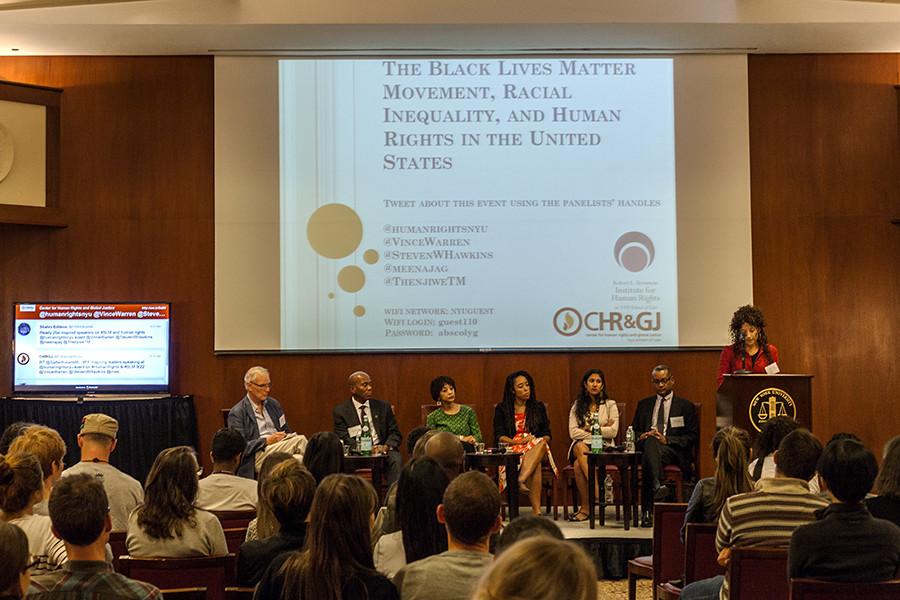Activists, legal figures discuss racial tensions in the U.S.
Nikki Reisch (far right) introduces the speakers at the #BlackLivesMatter event which took place at D’Agostino Hall on September 22nd.
September 23, 2015
In an effort to spark a more productive and powerful discussion about racial justice, the NYU School of Law hosted activists and academics for a panel discussion that questioned the larger implications of violence in the United States.
The panel, titled “The Black Lives Matter Movement, Racial Inequality and Human Rights in the United States,” was put together by the Center for Human Rights and Global Justice. Prominent figures in the human rights community spoke, including Executive Director of Amnesty International USA Steve Hawkins, who attended NYU Law.
Other speakers included UN Committee on the Elimination of Racial Discrimination member Gay J. McDougall, Community Justice Project member Meena Jagannath and Executive Director of the Center for Constitutional Rights Vince Warren.
Nikki Reisch, the center’s legal director, introduced the panel to the group at D’Agostino Hall and underscored need for the law school hold this panel.
“The aim of the panel tonight is to spark a critical debate about the relevance of international human rights — its laws, principles, institutions, discourse — to the struggle for racial justice here in the United States,” Reisch said.
The panel discussed the deaths of Trayvon Martin and Michael Brown and event moderator Philip Alston directed the conversation toward the United States’ position in the scope of international human rights.
“The big issue for us tonight, of course, is whether the U.S. is different [from other countries],” Alston said.
Social justice activist Thenjiwe McHarris spoke about the different implications of the word “violence” and how it is interpreted within the human rights realm.
“We can’t just define ‘violence’ based on killings,” McHarris said. “Violence is also when children can’t eat. Violence is also when a young person doesn’t have a home to go to. The killing of a young person is just as connected with a lack of housing, a lack of employment, a lack of health care: it’s a structural problem.”
McHarris also discussed the role of social media in issues of modern human rights, telling the story of how Palestinians had taught young people in Ferguson, Missouri, how to deal with tear gas, knowledge they had from personal experience. Meanwhile, Warren discussed the challenging aspects of the movement.
“What is fabulous about the movement for black lives and the moment that we’re in now is that it is a total revision, I think, or re-articulation of a vision of what it means to be a black person that does not live in fear,” Warren said. “It is really hard for us to think about what is a policy that would keep black people from being killed in the way that they are in this country.”
Hawkins echoed the rest of the panel and framed human rights as the most basic of needs emphasizing a holistic view of the issue.
“Human rights, at the end of the day, is about the right to be human,” Hawkins said.
Email Maggie O’Neill at [email protected].


























































































































































